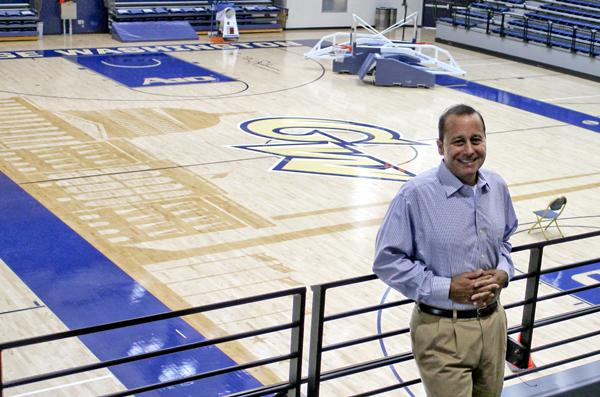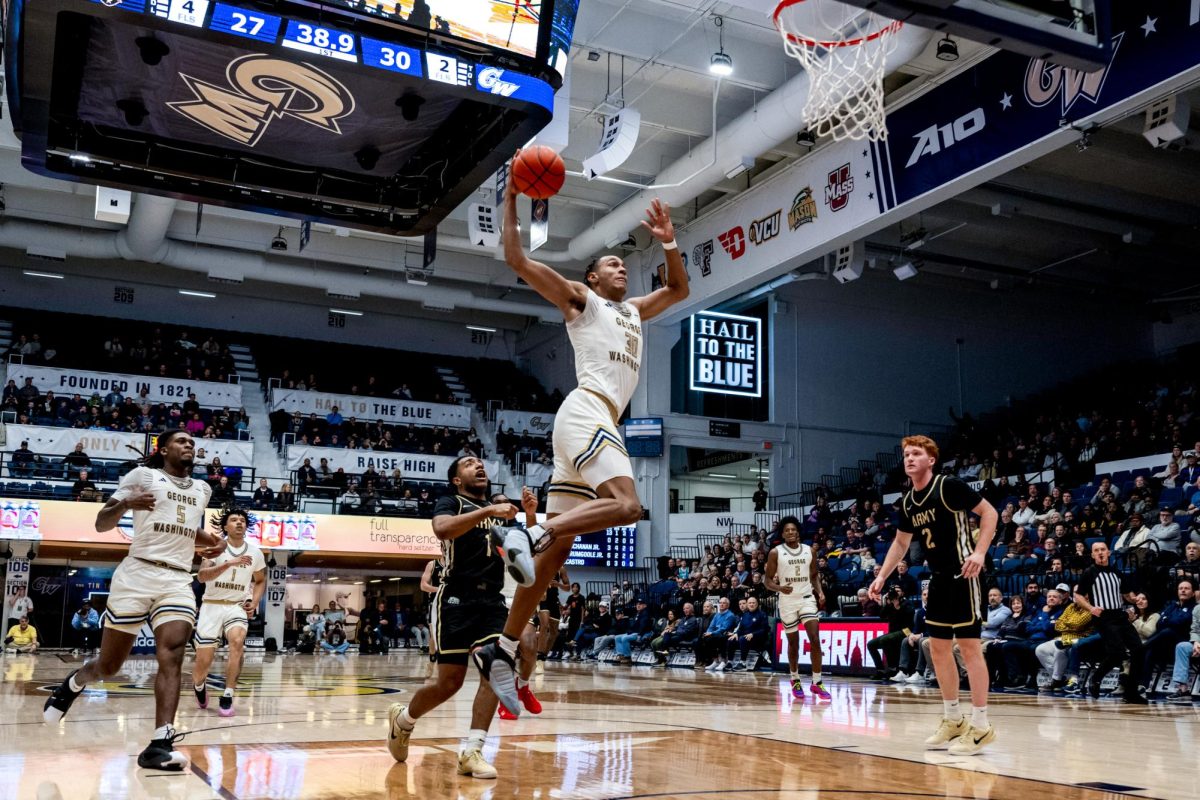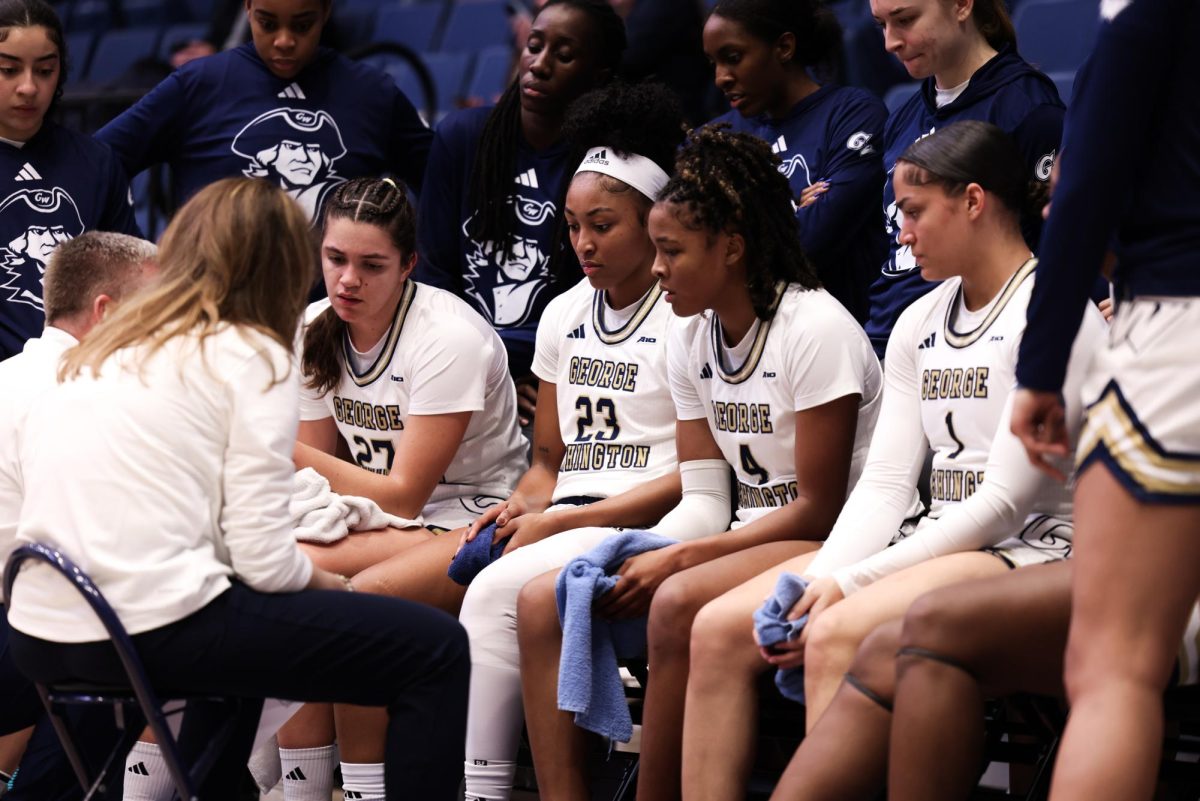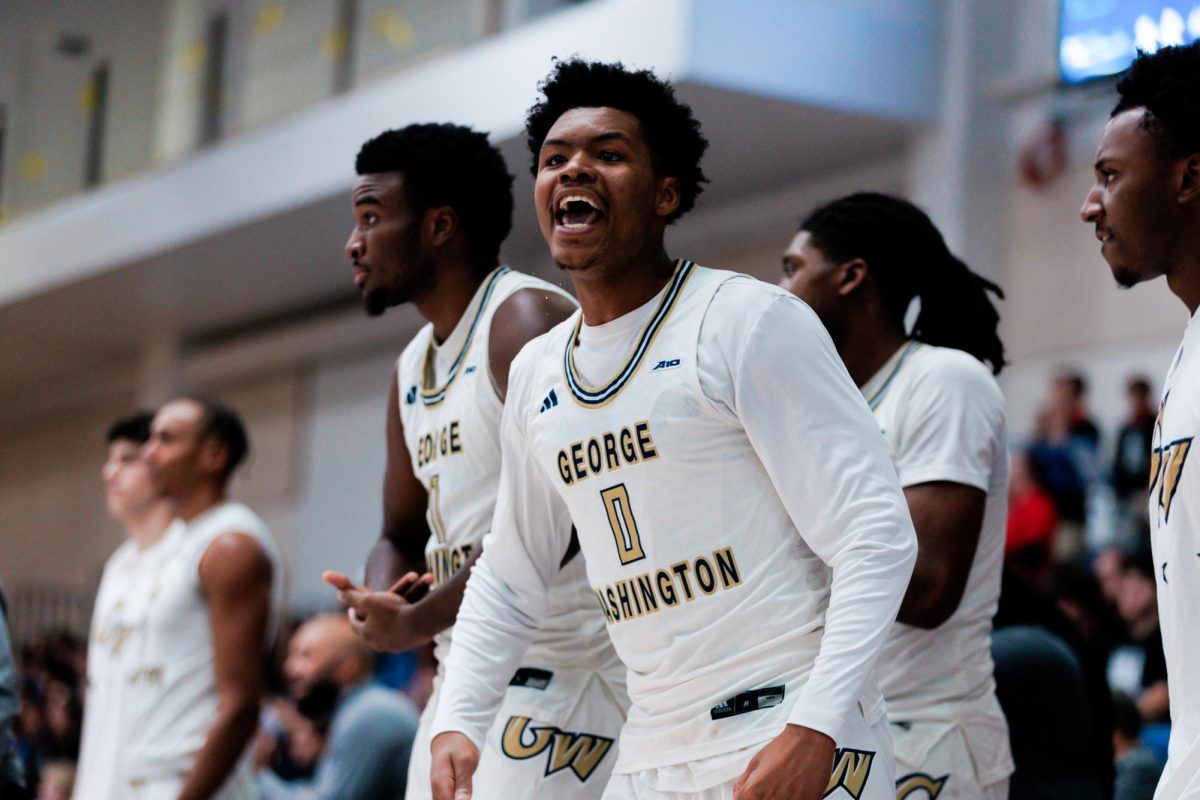With the amateur model of college sports under siege, Athletic Director Patrick Nero is confident GW is strongly positioned to enter “the new generation of college athletics.”
The fourth-year director said the Atlantic 10 will likely move with the most powerful conferences to expand benefits for student athletes, and that he is optimistic a college campus can continue to be a place for athletics.
“I think, yes, we’re at a critical point in time of figuring out how does the sports model work at a collegiate level,” Nero said. “I think anyone that resides on a campus feels like, yes, it’s a good place for sports on a college campus, but I think that we also find ourselves in a place where we’re not really sure what that should look like, but we’re really far down the road to back it up.”

The NCAA Division I Board of Directors ruled in August to give the five richest conferences – the Atlantic Coast, Big 12, Big 10, Pac-12 and Southeastern – autonomy in 11 legislative areas from financial aid and health care to travel expenses. The decision cleared the way for colleges to raise the high water mark for the kinds of resources they provide to student athletes.
The vote also acknowledged that the NCAA’s previous governing structure was outdated. It came at a time when lawsuits have questioned the legality of a college sports model that uses the idea of amateurism to justify making billions of dollars off athletes while paying only for their tuition, room and board.
Still, the ruling has faced criticism: Some say it will further the divide between the haves and have-nots in college sports.
The business, politics of college sports
Nero, an advocate for increasing student-athlete benefits, said he would like to adopt changes like expanded health care, continued education and coverage of post-season travel expenses, as well as full cost of attendance scholarships. GW, along with other colleges outside the Power Five, will be able to opt in to whichever rules are adopted as long as the school can afford it and that school’s conference approves it.
Nero said he predicts measures like the full cost of attendance scholarships to be in place as early as next year.
“I would expect that the Atlantic 10 in most instances will go with the same type of student-athlete benefits that those five conferences do,” Nero said. “I think it’s going to allow us as universities to make sure that the needs of the students are being met first, so I’m happy about that.”
A-10 Commissioner Bernadette McGlade said in a release last month that overall the move is popular among college sports administrators.
“The majority of the leadership in Division I supports enhancing student-athlete benefits,” McGlade said. “As for the Atlantic 10, we will evaluate each opportunity and adopt the proposals that make sense, benefit our student athletes and will be impactful to maintaining the national success that we have established in NCAA championship competition.”
But the league cannot join in all of the NCAA’s changes: The A-10 does not have a permanent seat on the new, larger Division I Board of Directors.
The A-10’s absence from the chief governing body leaves questions about how a conference that does not sponsor football, the driving force behind many of the legislative changes, will remain successful. All Football Bowl Subdivision schools are permanent members of the Board of Directors.
“There are other conferences that have permanent seats on the board – conferences that don’t bring to the table the financial revenues that the A-10 has in the sport of men’s basketball,” Nero said. “To have been left off the board on a consistent basis I think was wrong.”
The NCAA made $912.8 million from 2012 to 2013, and 84 percent of that revenue came from the Division I men’s basketball tournament. The A-10 received an $8.1 million payout from the NCAA Basketball tournament in 2013, the seventh-largest behind the Power Five and the Big East.
Payouts correspond to conference teams performances in the NCAA tournament. GW’s men’s basketball team made it to the big dance for the first time in seven years last season, losing in the second round to Memphis.
Men’s basketball head coach Mike Lonergan said he was “a little surprised” by the autonomy decision, and though he supports increasing benefits in the areas of nutrition, academic support and health care, he said he is concerned about the football interest overriding other sports.
“I just don’t want to see the powers that be at schools with BCS football programs make decisions that could ruin the NCAA Basketball Tournament, which is a tremendous event. I also don’t want to see other sports get hurt by these football decisions,” Lonergan said.
The structural changes have left officials wondering how high revenue-generating programs can continue to coexist alongside those that don’t boast the same kind of publicity.
Amateur athletes, full-time students
Still, women’s soccer head coach Sarah Barnes said she thought the reforms could be “good for everyone” because they ultimately create safer conditions for players.

David Ridpath, a co-editor for the Journal of Issues in Intercollegiate Athletics, said he does not see a “long-term happy marriage” between the Power Five and the rest of Division I. He said conferences that generate the largest revenues are driving a professionalization of college sports, and attempts to keep pace with more student-athlete benefits and new facilities can cripple even Division I schools.
“I do not believe that big-time football and basketball are about education,” Ridpath said. “It has never been amateur in the true sense of the word for 100 years.”
Nero said he believes the University’s athletic model is sustainable. While he does worry about the future, the fourth-year athletic director thinks GW has been able to promote an academic culture among student athletes, who earned a program-record 3.22 cumulative grade-point average last spring.
Emphasizing academics has not hurt recruiting, Nero added. The women’s basketball team, for example, welcomed the top-rated recruiting class in the A-10 to campus this fall.
Among the changes sports administrators have proposed, Nero said he would also support the creation of an alternate organization, like the minor leagues in baseball, for athletes who are interested in professional careers but not necessarily in a college degree.
“What’s hurting us in sports, in basketball and football right now, is that the student athletes don’t seem to have options,” Nero said. “I’m fine with them having other options because that will mean that those who are on campus really want to be there and will be focused on education.”







